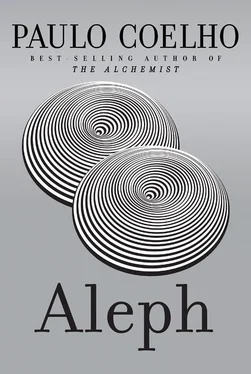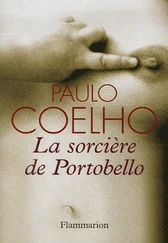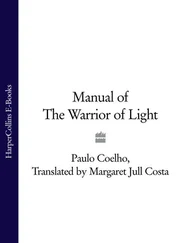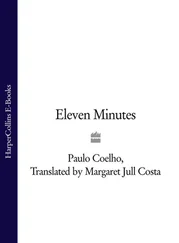I think to myself that this really isn’t something I should concern myself with.
“You asked me on the train if I would like to go somewhere with you tonight. Is that offer still open? We can talk more about all this later. If you had ever seen me watching my wife sleeping, you would be able to read my eyes and understand why we’ve been married for nearly thirty years.”
WALKING IS DOING WONDERS for my body and soul. I’m completely focused on the present moment, for that is where all signs, parallel worlds, and miracles are to be found. Time really doesn’t exist. Yao can speak of the tsar’s death as if it had happened yesterday and show me the wounds of his love as if they had appeared only minutes before, while I remember the platform at Moscow station as if it belongs to the distant past.
We sit down in a park and watch the people passing: women with children; men in a hurry; boys standing around a radio blasting out music; girls gathered opposite them, talking animatedly about something utterly unimportant; and older people wearing long winter coats, even though it’s spring. Yao buys us a couple of hot dogs and rejoins me.
“Is it difficult to write?” he asks.
“No. Is it difficult to learn so many foreign languages?”
“No, not really. You just have to pay attention.”
“Well, I pay attention all the time, but I’ve never got beyond what I learned as a boy.”
“And I’ve never tried to write, because as a child I was told that I’d have to study really hard, read lots of boring books, and mix with intellectuals. And I hate intellectuals.”
I don’t know if this remark is intended for me or not. I have my mouth full of hot dog, and so don’t reply. I think again about Hilal and the Aleph. Perhaps she found the experience so alarming that she’s gone home and decided not to continue the journey. A few months ago, I would have been driven frantic if a process like this had failed to run its full course, believing that my entire apprenticeship depended on it. But it’s a sunny day, and if the world seems to be at peace, that’s because it is.
“What do you need in order to be able to write?” Yao asks.
“To love. As you loved your wife, or, rather, as you love your wife.”
“Is that all?”
“You see this park? There are all kinds of stories here, and even though they’ve been told many times, they still deserve to be told again. The writer, the singer, the gardener, the translator, we are all a mirror of our time. We all pour our love into our work. In my case, obviously, reading is very important, but anyone who puts all his faith in academic tomes and creative-writing courses is missing the point: words are life set down on paper. So seek out the company of others.”
“Whenever I saw those literature courses at the university where I taught, it all seemed to me so…”
“Artificial?” I ask, completing his sentence. “No one can learn to love by following a manual, and no one can learn to write by following a course. I’m not telling you to seek out other writers but to find people with different skills from yourself, because writing is no different from any other activity done with joy and enthusiasm.”
“What about writing a book about the last days of Nicholas the Second?”
“It’s not a subject that really interests me. It’s an extraordinary story, but for me, writing is, above all, about discovering myself. If I had to give you one piece of advice, it would be this: don’t be intimidated by other people’s opinions. Only mediocrity is sure of itself, so take risks and do what you really want to do. Seek out people who aren’t afraid of making mistakes and who, therefore, do make mistakes. Because of that, their work often isn’t recognized, but they are precisely the kind of people who change the world and, after many mistakes, do something that will transform their own community completely.”
“Like Hilal.”
“Yes, like Hilal. But let me say one thing: what you felt for your wife, I feel for mine. I’m no saint, and I have no intention of becoming one, but, to use your image, we were two clouds, and now we are one. We were two ice cubes that the sunlight melted, and now we are the same free-flowing water.”
“And yet, when I walked past and saw the way you and Hilal were looking at each other…”
I don’t respond, and he lets the matter drop.
In the park, the boys never look at the girls standing just a few meters from them, even though the two groups are clearly fascinated by each other. The older people walk past, thinking about their childhood. Mothers smile at their children as if they were all future artists, millionaires, and presidents of the republic. The scene before us is a synthesis of human behavior.
“I’ve lived in many countries,” says Yao. “And obviously, I’ve been through some difficult times, known injustice, and fallen flat on my face when everyone expected the best from me. But those memories have no relevance to my life. The important things that stay are the moments spent listening to people singing, telling stories, enjoying life. I lost my wife twenty years ago, and yet it seems like yesterday. She’s still here, sitting on this bench with us, remembering the happy times we had together.”
Yes, she’s still here, and I would explain that to him if I could find the words.
My emotions have been very close to the surface ever since I saw the Aleph and understood what J. meant. I don’t know if I’m going to be able to solve this problem, but at least I’m aware that it exists.
“It’s always worth telling a story, even if only to your family. How many children do you have?”
“Two sons and two daughters. But they’re not interested in my stories. They say they’ve heard them all before. Are you going to write a book about your trip on the Trans-Siberian Railway?”
“No.”
Even if I wanted to, how could I describe the Aleph?
THE OMNIPRESENT HILAL HAS STILL NOT REAPPEARED.
After keeping my feelings to myself throughout most of the supper, saying how well the signing session went and thanking everyone for that and for the Russian music and dance put on for me at the party afterward (bands in Moscow and in other countries always tend to stick to an international repertoire), I finally ask if anyone had remembered to give her the address of the restaurant.
They stare at me in amazement. Of course they hadn’t! They all thought I was finding the girl a real pest. It was just lucky she didn’t turn up during the signing session.
“She might have given another of her violin recitals, hoping to steal the limelight again,” says my editor.
Yao is watching me from the other side of the table. He knows that I mean the exact opposite, and that I would love her to be here. But why? So that I could visit the Aleph again and go through a door that only ever brings me bad memories? I know where that door leads. I’ve been through it four times before and have never been able to find the answer I need. That isn’t what I came looking for when I began the long journey back to my kingdom.
We finish supper. The two readers’ representatives, chosen at random, take photographs and ask if I would like them to show me the city. I tell them yes, I would.
“We already have a date,” says Yao.
My publishers’ irritation, previously directed at Hilal and her insistence on being with me all the time, is now turned on my interpreter, whom they employed and who is now demanding my presence when it should be the other way around.
“I think Paulo’s tired,” says my publisher. “It’s been a long day.”
“He’s not tired. His energy levels are fine after all the loving vibes from this evening.”
Читать дальше
